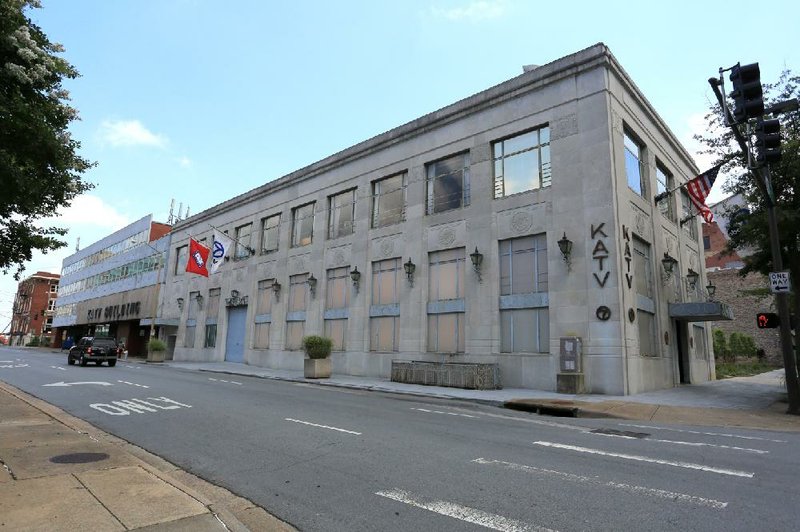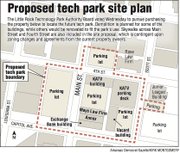Some historic preservationists are upset that the preliminary site plan for Little Rock's future technology park calls for demolishing the old Worthen Bank building that houses KATV now, but park development officials say there's a chance the building won't have to be torn down.
Document set
Little Rock Technology Park
- McKuin's letter to Little Rock Technology Park Authority Board
- Architect's plans for downtown LR tech park site
- Anderson's letter to mayor, board of directors
- Fourth site proposed for LR Technology Park
- Crafton Tull Site Reports for Technology Park
- Little Rock Technology Park Authority Board Meeting
- Charles Dilks' Feb. 6 letter to Mary Good
- Preliminary findings from Charles Dilks on possible technology park sites
Real estate consultant Jeff Yates unveiled his proposal for the tech park's location Wednesday. The Little Rock Technology Park Authority Board unanimously voted to move forward in negotiating for the proposed properties.
The suggested site is in and adjacent to a downtown city block between Main and Scott streets on the north side of Capitol Avenue. The site includes KATV's studio and parking garage; the vacant building often referred to as the old Stephens building; the old Exchange Bank building and its annex, the Mays Byrd and Associates law firm; and five parking lots.
Yates' development plan calls for renovation of the law firm offices and the Exchange Bank building, which went up in 1921 and is listed on the National Register of Historic Places. That would become the first phase of the planned 540,000-square-foot tech park.
But the parking lots, the old Stephens building and KATV's studio and parking deck are scheduled for demolition in the plan -- though Yates cautioned that the proposal is preliminary and the decision on what to tear down has not been made.
"The architects and engineers can come in and figure out if the facade -- the historic elements of the Worthen Bank building -- can stay and be integrated into redevelopment, and whether the new buildings can be made to look old and the whole thing can be part of the urban fabric," Yates said. "That's all way past where I am right now. I'm just trying to secure the site and allow all the design people to step up and make the rest happen."
The W.B. Worthen Co. commissioned renowned architect George Mann, who designed the Arkansas Capitol, to design the bank's headquarters in 1928 in a neoclassical style. When the National Register of Historic Places recognized the building in 1986, Worthen Bank was Little Rock's oldest, continuously operated financial institution. KATV owned the structure at that time.
Founded in 1877, the bank had become the largest bank in Arkansas by the time it moved from the location at Main and Fourth streets in 1969.
"The Worthen building has been listed on the registry since the mid-'80s. It's importance in Little Rock history has been understood for a long time. We are very disappointed to hear they are planning on tearing that building down," said Mark Christ, Arkansas Historic Preservation Program's community outreach director.
The Historic Preservation Alliance of Arkansas will actively oppose the demolition of the Worthen building, its executive director, Vanessa McKuin, said.
The tech park board's out-of-town consultant, Charles Dilks, told the board Wednesday that one challenge in the way of the park becoming successful is the ability to "create a sense of place."
McKuin said the Main Street corridor already has a sense of place and tearing down a prominent structure would be detrimental to that.
"A really critical component of reinforcing the sense of place is the continuation of these distinctive structures that give people an understanding of where they are. It's some place with history, a place that matters. It's not a strip mall," McKuin said. She called the proposal to demolish the landmark "shortsighted and unwise."
She also noted that if the building is torn down, tech park developers would be losing out on state and federal rehabilitation tax credits that could be used for its rehabilitation.
"It's a little premature" to say what will be demolished or not, said Sharon Priest, executive director of the Downtown Little Rock Partnership, which proposed the chosen site.
It's possible to leave the facade of the television studio building on Main Street, which no longer has the W.B. Worthen Co. engraving it originally displayed.
"People have a tendency to throw spears before they know the entire plan," Priest said. "I think it's important that [the authority board has] just now said they are going to spend $7,500 on doing a conceptual drawing for the area. Let's wait and see what they come up with."
Yates, the real estate consultant, said everything in his initial development concept could change, adding that the plan was a quick drawing to help the board visualize what the property could become. Part of creating a more detailed conceptual drawing will include designers making initial determinations on which structures could be kept and which would have to be torn down.
Even if the final plan calls for the demolition of the Worthen building, downtown real estate executive Rhett Tucker of Moses Tucker Real Estate said it would be worth the economic benefits of the tech park.
"We would always support trying to save historic buildings, but I think what you have to weigh it against is this opportunity for job creation," Tucker said. "Over the years, Alltel has sold, many of the major banks have sold out to out-of-state banks. The sources of jobs are just not what they used to be."
Technology parks offer cheap laboratory and office space to startup companies that agree to use local research from area universities and hospitals to help put products on the market, ultimately with a goal of locating their businesses and creating jobs in the area. The University of Arkansas at Little Rock, the University of Arkansas for Medical Sciences, Arkansas Children's Hospital and the city have all signed on as sponsors of Little Rock's tech park.
"I view this [potential demolition of the Worthen building] as a necessary thing to be able to have the opportunity of job creation -- it's worked so well in many other cities," Tucker said of tech parks.
"We always look to state government and UAMS as big employers in our community, and we need to have the opportunity to grow jobs in the private sector. I think this gives us the best opportunity we've had for that purpose in a long time."
A Section on 07/12/2014


